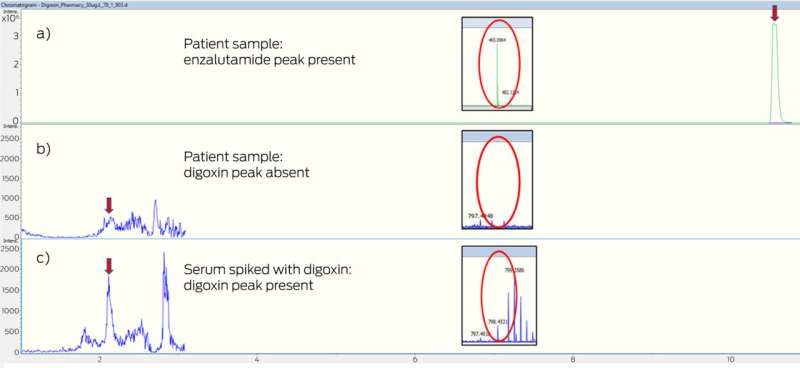This article has been reviewed according to Science X's editorial process and policies. Editors have highlighted the following attributes while ensuring the content's credibility:
fact-checked
peer-reviewed publication
trusted source
proofread
Rapid drug test to provide patients with better care

Teams at two of Melbourne's leading research and medical institutes are developing high-tech solutions to rapidly test for drugs and better treat patients presenting to hospital.
The researchers from the Colonial Foundation Healthy Aging Center—a collaboration between WEHI and the Royal Melbourne Hospital—are using mass spectrometry technology to quickly determine the presence of other medication or drugs that may interfere with their treatment.
This is important to ensure they are given the correct treatment—and the impact of any previous medication or drugs are mitigated.
Mass spectrometry technology works by using charged particles, or ions, to identify and measure chemicals in a sample.
The team found this is more accurate than current testing methods, which use a biochemical test called immunoassays that may sometimes give false positives.
Preventing false toxic results
In a study, titled "Measurement of digoxin levels falsely affected by enzalutamide," published in the Medical Journal of Australia, the Colonial Center team found that using traditional testing methods, a common prostate cancer drug could interfere with testing for another common heart failure medication and lead to a patient returning a false toxic result.
But by using mass spectrometry technology to complete the same test, this interference was able to be picked up and mitigated.
As a result, the patient avoided unnecessary treatment, and clinicians were able to focus on and treat the patient's actual issue.
Enhanced precision in treatment
Head of the Colonial Foundation Healthy Aging Center, Associate Professor Andrew Webb, said the research could offer better results for patients by helping clinicians provide better treatment.
Head of Chemical Pathology at the RMH and researcher at the Colonial Center, Associate Professor Cherie Chiang, said having a fast, reliable and accurate reading is essential to providing great patient care.
"This new-age technology is enabling our teams to provide more specific results, and therefore treatment options, to our clinicians in real-time," Assoc Prof Chiang said.
"As a result, we can provide patients with more personalized treatment plans and greater care."
She said the next steps were to "expand our testing menu so more patients can potentially benefit from this new technology."
The move is part of a shift towards personalized medicine—which centers around testing and tailoring treatment to a patient's specific needs.
More information: Noor Lammoza et al, Measurement of digoxin levels falsely affected by enzalutamide, Medical Journal of Australia (2024). DOI: 10.5694/mja2.52289




















